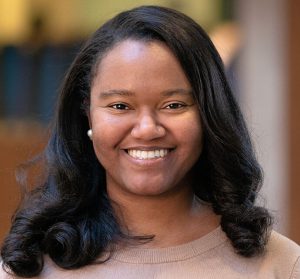Dominique Sylvers
 Graduate Student
Graduate Student
@DomSylvers
What is your area of research or expertise that you bring to the Landscapes collaboration?
Overall, I study Black-White inequalities in health and aging. With the Landscapes collaboration, I will be examining how residential and educational segregation can lead to differences in accelerated aging between Black and White older adults. For my dissertation, I’ll specifically be looking at the ways in which education in the U.S. has functioned as a system to reproduce inequality, with lasting impacts over time and over the life course.
What do you find challenging or exciting about interdisciplinary collaboration?
What I find most challenging about interdisciplinary collaboration is having and maintaining a sense of “disciplinary purity.” My undergraduate degree was literally titled “Interdisciplinary in Social Sciences,” where I took courses in Sociology, Geography, Medical Anthropology, and the like. It was a course in Philosophy and a Bioethics study abroad program that provoked my final decision to pursue training in Public Health. Interdisciplinary collaboration and thought are a part of my nature. Especially in doing research from a structural lens, it’s so hard to function as if everything isn’t all connected in some way. Even in a field as interdisciplinary as Public Health, we are taught to work according to our specific discipline first, and everything else can inform our work second. Well, I work in more of an opposite manner. I think that’s how I find myself in more interdisciplinary circles, which is the most exciting part for me – whereas finding my place within my discipline takes a little more time.
What’s one common misconception about your area of research that you’d like to dispel?
One common misconception about my area of research is the need to immediately create an intervention based on findings. Yes, research creates the evidence, but I think what we’ve seen when it comes to education is that the most harm to progress has been the result of some intervention or policy change that had either unintended consequences or very strong backlash that worked against intended progress. Some may think “doing something is better than nothing,” and while we wouldn’t necessarily do nothing for the long term, we don’t want to keep doing the wrong things.
How did you become interested in structural racism and health?
I started off my public health journey very interested in conducting health behavior research and have worked on studies teaching health education, specifically health behavior modification, to older adults with chronic illness. I enjoyed the work, and recognize that such interventions have their place, and can be a real joy to community members. The thing is, I worked on one study with participants who were residents of Ann Arbor, while I simultaneously worked on another study with residents of Detroit and noticed very stark differences. It was then that I could no longer ignore what I knew to be true – that so much of this work around health disparities is so much deeper than behavior change.
What’s the academic path that brought you to where you are now?
I attended Michigan State University, with a deep desire to go into medicine and fought with all my might to stay that course, but participating in the Ronald E. McNair Scholars program really changed my life by making me fall in love with research. This experience led to changing my major in order to dive deep into the world of health within the Social Sciences. Then the nudge from my longtime mentor, Dr. Dedra Eatmon, regarding the impact of obtaining a PhD (conducting important research, teaching and mentoring the next young mind, etc.), really led me down this path. I obtained my Master’s in Public Health from the School of Public Health in 2017. Knowing I wanted to continue on, I applied for my department’s doctoral program and matriculated in 2018. Since starting my doctoral education, I’ve been extremely fortunate to be mentored by Dr. Maggie Hicken and Dr. Philippa Clarke. From grant writing, to conference presentations, book chapters and many other collaborations, publishing my very first first-authored journal, helping me to understand how to actually analyze data outside of the classroom – they’ve just given me so much support, and I still have a whole dissertation process to finish! I’ve really just been soaking up the entire doctoral experience these last four years, and it’s all coming together to make a very rich dissertation process. So, if I had to sum up how exactly my path led me here, I’d say great mentorship.
If you had the opportunity to get one question answered by an omniscient being, what would you ask? (this is meant to be a lighthearted question–we’re trying to get to the heart of what you are most curious about, whether within your field of research or beyond! Feel free to think big!)
I think I would just ask “will this all make sense, one day?” and by this, I just mean everything, every single thing, life. At the end of the day, I just want to be reassured that all the work we do, the things we live through, somewhere in some likely far-off reality, has a largely greater purpose beyond what we can see today.
Anything else you want to share?
No, nothing really. This was fun!
